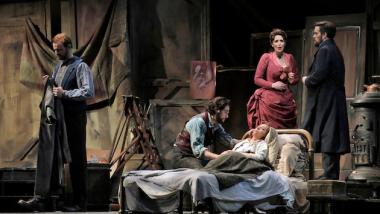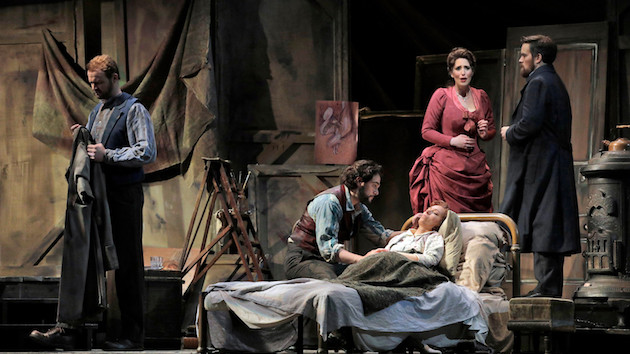
One of the marvels of La Bohème, renewed on each encounter, is how simultaneously lush and leanly made the 1896 Puccini masterwork is. In all four of its tightly wrought acts, the languorously romantic and impatiently urgent are tumbled together, the whole thing kinetically charged with love, ambition, callow vanity, and doom.
The challenge for any production is to make these disparate forces both crackle and cohere. The San Francisco Opera revival of a 2014 staging that opened over the weekend at the War Memorial Opera House was a case study in how invigorating but difficult achieving that objective can be. With a cast that looked convincing as a cadre of scruffy Parisian wannabes but generally sang better than they acted, and a conductor who too often seemed at odds with them, Saturday’s opening-night performance gave off some volatile heat and light. Some of it was dramatically productive, and some was not.
A notable highlight came in Act 3, set near the snow-sprinkled gloom of a Parisian city gate. The consumptive Mimi (Erika Grimaldi), in distress about a fraying relationship with her jealous lover, Rodolfo (Arturo Chacón-Cruz), has come to seek out the counsel of a friend. Marcello (Audun Iversen), only too familiar with the ravages of sexual possessiveness, lends a sympathetic ear.
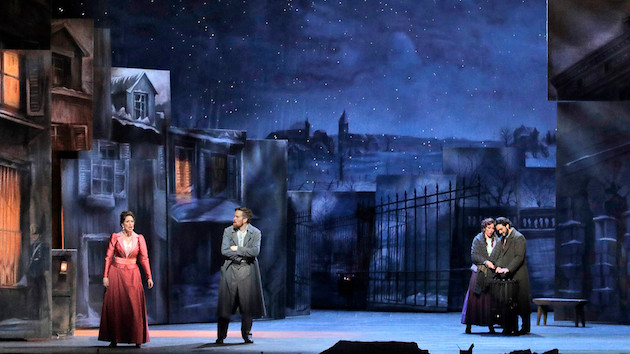
Clasped together in a firm but chaste embrace, Grimaldi and Iversen spun out their duet in terms at once soaring and tenderly intimate. It was all achingly real, set off by the evocatively austere scene by production designer David Farley and bluish predawn lighting by Michael James Clark.
When a miserable Rodolfo showed up, followed by Marcello’s tauntingly blithe lover Musetta (Ellie Dehn), the musical and emotional oscillation of the act continued to breathe and flow. As Mimi and Rodolfo felt their way to a resigned reconciliation, Marcello and Musetta rekindled their smoldering hostilities. The orchestra, under conductor Carlo Montanaro’s otherwise erratic baton, stayed largely and sensitively in accord with the singers.
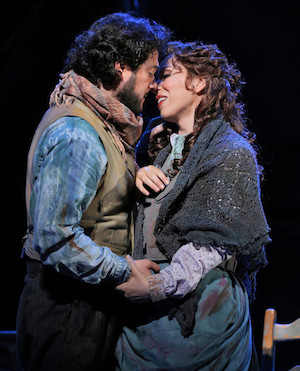
That all stood out in sharp relief against Rodolfo and Mimi’s first meeting in Act 1. After speeding through the four male roommates’ opening horseplay, managed too cutely by director John Caird, this unsteadily paced Bohème made the customary hushed approach to Mimi’s soft knock at the door. Once the door was opened, unfortunately, the famous love scene that followed played out in mechanical fashion.
Neither Chacón-Cruz’s sinewy, pinched tenor nor his remote acting style warmed up “Che gelida manina.” Grimaldi (in a role she shares with Julie Adams June 20 and 25) unfurled a broad, sumptuous tone and keenly shaped phrasing of her solo, “Mi chiamo Mimi.” But she, too, seemed to be less than fully engaged in what ought to be a sweet and febrile flirtation. Even as their voices powered out in the great love duet, the pair never fully gripped the listener. Nor did they seem to capture Montanaro’s entire attention, as entrances and phrasing wobbled between the stage and pit.
At that, with a nimble turn of the set, Café Momus rotated into view. Caird’s staging of the chaotic Latin Quarter scene, brimming over with toy-maddened children and a full-on marching band, was a buoyant, chaotic delight. Dehn, swaddled in a dress of elaborated, draped hot pink, made a minor feast of Musetta’s sultry waltz. Even her borderline over-the-top body rubs of Iversen’s miserably hunched Marcello worked.
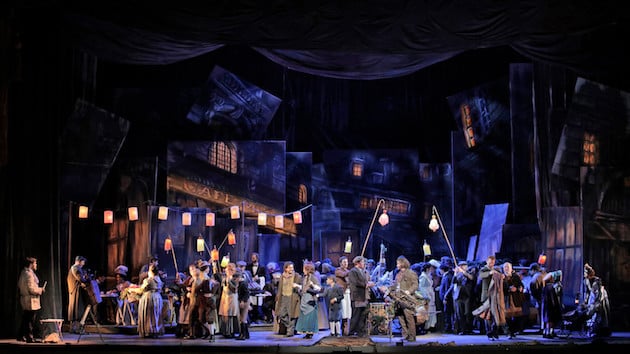
And so it went all night in a Bohème that winked in and out of focus, both musically and dramatically. The Act 4 return to the garret produced more of the fleet and sketchily enacted byplay of the young artists. Bass Scott Conner sang Colline’s somber overcoat aria with murmurous, effectively understated conviction. Dehn, who made the most of Musetta’s scenes, brought a jolt of rawly voiced alarm into the room when she announced Mimi’s unexpected return. But Mimi’s death scene, like the opening love scene, failed to take full hold of the listener. Without a pair of rapturous, desperate lovers at its core, La Bohème is always going to come up a little short. And so it did on opening night.
That said, the vigor and vocal exuberance of the cast, unruly as they sometimes were on Saturday, suggested that this production might well ripen through its run. The vocal and instrumental components are likely to mesh more smoothly. One of the things that makes this opera so wrenching to watch, particularly if one’s own youthful excesses are somewhat distant memories, is how heedless these artists and strivers are of what’s to come. A certain measure of unpredictability and instability may not be such a bad thing for any La Bohème.

